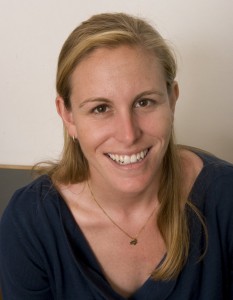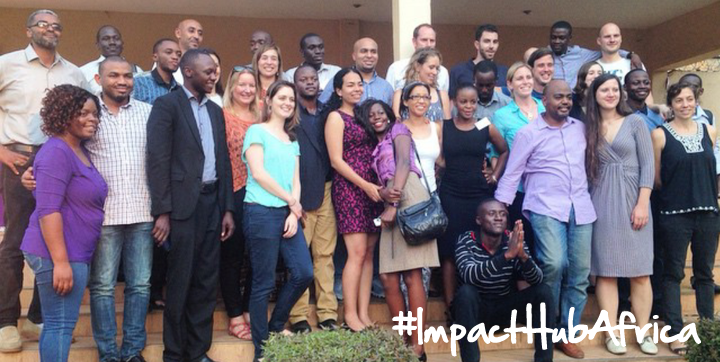A Conversation with Natalie Miller of Impact Hub’s Africa Support Team
SOCAP has a long time affiliation with the global Impact Hub Network. We have been following Impact Hub’s recent expansion in Africa with great interest. To facilitate sustainable business ideas and creation across the continent, Impact Hub’s Africa Seed Program supports entrepreneurial teams interested in starting Impact Hubs in their cities. Impact Hub hopes to catalyze change in Africa by helping local entrepreneurs develop the skills to scale their enterprises while connecting them with the global impact community. To learn more we talked to Natalie Miller, Head of Strategy and Business Development for Impact Hub in Africa, to hear her perspective on recent developments and her projections for the future in the impact ecosystem in Africa.
SOCAP: There is a growing momentum towards investment in Africa and social entrepreneurship as a means of creating change. You have lived in South Africa since 2006. Can you give us an on the ground perspective?
Natalie Miller: I have lived here for almost 10 years, and have worked across Africa in nearly twenty countries, mostly while in the global non-profit space. I would say beginning about five to ten years ago people started looking at Africa, instead of as the “dark continent”, as the next frontier. There has definitely been an increase in interest as well as engagement in the region from the more risk tolerant and adventuresome investors, and more focus from impact investors and foundations on the innovative methods entrepreneurs are using to solve local problems through market-driven approaches.
There is still caution and question marks and a huge lack of venture capital. Most self-proclaimed VCs are more private equity investors and so there is a significant lack of support and funding for ideation stage entrepreneurs. But, there is a growing emphasis now on Africa and people are starting to realize that if they are running multi-national companies, part of global organizations, or an investor and they’re not really looking at the African markets, then they’re gonna quickly lose out.
SOCAP: What are some of the current challenges to building a robust impact ecosystem in Africa?
Lack of access to finance is always professed to be the main issue for entrepreneurs. It is to some degree, but capacity development support and access to markets is more so. If there is an investment-ready enterprise, there will be investors ready to throw money their way. It’s getting them to investment-ready stage. There is a significant need to support entrepreneurs to develop their idea, build a prototype, get it to market and only then, when they can prove the market value and business case, will investors be ready to hand over cash. Access to finance during ideation stage and the mentorship and coaching to help the entrepreneurs get to market is what I believe is currently the main challenge on this continent, in this space.
This is the value that Impact Hub and similar eco-system builders bring, but we do not yet capitalize on it well. Our pipelines are heavily sought after by investors but as a community, hubs, makerspaces, incubation programs and accelerators, we do not always monetize the value we bring to investors. Many would say eco-system builders’ lack of sustainability is a big issue in this space in Africa. Impact Hub is about creating impact-driven, financially viable Impact Hubs so we hope to be part of changing that dynamic.
Another issue is lack of international awareness. It’s buzzing here, and things like the Global Entrepreneurship Summit, and Obama’s visit to Kenya are perpetuating it, but there’s so much happening of which there’s little knowledge, besides amongst Africa-focused players. There’s a huge international focus on only a few countries, so people might know what’s going on in Kenya, possibly Nigeria and South Africa and maybe even in Rwanda and Ghana as well. Outside of that people do not think anything is happening, but if you look at Impact Hub’s new teams, it’s super exciting. We have teams in some of the better known markets like Ghana and Rwanda but also in Mali, Sudan, and Zimbabwe and Candidate teams in Burundi, DRC (Congo), Ethiopia, Sierra Leone as well as Kenya. We hope these teams will be part of making their entrepreneurial communities more visible and a larger focus for investors.
How can the American, or global, impact community, get involved in the movement to overcome those challenges?
There is still a great need for risk tolerant investors to fund early stage entrepreneurs. At the same time we need partnerships and investment into the ecosystem builders who develop and support these entrepreneurs. We need venture philanthropy and access to working capital to enable the capacity building of entrepreneurs and the interconnectivity we are trying to develop between innovation spaces and support entities across the continent.
I recently met with a fund connected to the US government focused on investing in SMEs. They had 40 million dollars to invest in Tanzanian startups. They wanted us to provide them with a pipeline yet they had no capacity development funding to help in building the ecosystem or to invest in those that are doing so. Many groups know that if they go through an organization like Impact Hub, they’ll find a higher caliber of start ups and more investment-ready projects and yet, they don’t invest in us. That does not seem to be a sustainable system.
If we weren’t there, they would have to invest much more in sourcing, vetting, and doing their own capacity building efforts. Supporting the ecosystem builders, those that are turning out these entrepreneurs, is critical. Help us to ensure that the accelerators and the innovation spaces can do the job investors and other players in the space need us to do.
How many Impact Hubs are operating or developing in Africa now, and where are they located?
Over 45 teams from 26 countries expressed interest in the inaugural Africa Seed Program. Seven were chosen for the program and five were approved: Accra, Ghana; Bamako, Mali; Harare, Zimbabwe, Kigali, Rwanda and Khartoum, Sudan.
Our Resilience Africa program which includes the second Africa Seed Program is currently working with five new Candidate teams to support them in applying to the network. Impact Hub Candidate teams are in Addis Ababa, Ethiopia, Bujumbura, Burundi; Freetown, Sierra Leone; Kinshasa, Democratic Republic of Congo (DRC) and Nairobi, Kenya.
Until this year the only Impact Hub in Africa was Impact Hub Johannesburg, which has been operating since 2005.
Can you describe the application process the teams go through to become an Impact Hub?
There are two application processes. First, teams apply to become candidates. They provide a short introductory video showcasing the team of a minimum of three co-founders, a brief market analysis of the entrepreneurial space in their city and a write up of a Hackathon they are to conduct within their communities focused on sustainable business models. They also pay an application fee that will cover the cost of their mentor’s time who is an Impact Hub Founder from another city. If they are not accepted as a candidate, their money is reimbursed.
Once candidacy is approved, teams have six months to submit a comprehensive feasibility study including a large scale market analysis and an extensive business plan. If the global network of Impact Hubs then votes to approve that candidate, the team is officially named an Impact Hub initiative and they are given 18 months find a space, secure startup capital and launch.
Is there a story that comes to mind that illustrates the outcome you’re working towards in developing this infrastructure in Africa?
Impact Hub Accra (Ghana) recently held a well attended event, Pitch for Accra, co-hosted by Steve and Jean Case of the Case Foundation. It was exciting that there were so many large players at their first event as an Impact Hub. They had an impressive group of local startups that pitched, a variety of players from both from other hubs and accelerator programs and from the investment community and it was a great show of collaboration amongst a variety of groups with one well-deserved enterprise going home with $25,000.
Overall, we have high caliber, impressive teams. One of the cofounders of Impact Hub Bamako, in Mali, Issam Chleuh, was just voted one of the top 30 Young African entrepreneurs by Forbes. Another cofounder, Kadidia Konare, has been with World Bank for ten years and is currently on leave to serve as Special Investment Advisor to the President of Mali.
The Khartoum team is made up of six rock star Sudanese entrepreneurs including Ihab Osman, former CEO of Sudatel, the biggest telecommunications company in the country.
Our Zimbabwe team is an all women’s rock star team, focused heavily on women’s entrepreneurship and youth. Both our Kigali and Accra teams were running spaces prior to applying to Impact Hub, but saw the value of being part of the network.
Where do you hope to be 5 years from now?
What I hope is that by utilizing the network, both regionally and globally, we will really be able to bridge some of the current gaps, and interconnect these incredible individuals and Impact Hubs, to a degree that we are providing access to markets to the entrepreneurs within our Impact Hub communities. So, an entrepreneur in Harare can get access to market in Accra for example, and then, even to Amsterdam or Berlin.
I hope that we’re looked at as a go-to when it comes to pipeline, and in a way that adds value to our structure as well. That we are creating a solution for supporting very early, ideation stage enterprises and bringing them to investment level. That we are able to provide a safety net to investors and players both inside and also outside of Africa who are keen to get in the African entrepreneurship space but don’t necessarily know how or are scared off by the perceived risk. Hopefully, we can really build this ecosystem up and not just in a couple of the focus countries, but across the continent.
What’s inspiring you in your work right now? What’s giving you hope for the future?
The rockstar teams are inspiring me. They are already doing amazing things and most teams have not launched their Impact Hub yet. They’re locally rooted and therefore tuned into local realities and opportunities. These are amazing individuals who want to be part of the growth and strengthening of the continent through producing locally-grounded, locally-developed solutions and supporting entrepreneurs who are leading the leapfrogging efforts. The teams are incredibly passionate and hard working and make me confident that the hard work we are putting into this will all be very worthwhile.
What subject is too often left out of conversations surrounding impact in Africa?
If you really want to support large scale growth of entrepreneurs then you have to support ecosystem builders as well.
The only other thing I would stress is that when something works and it’s exciting, it starts to become trendy and everyone tries to recreate it. We are seeing some governments, development aid agencies and companies coming in and trying to build their own innovation spaces instead of supporting the grassroots ones that already exist, even when they don’t necessarily have the expertise and experience in running a space. Lets try to work together and see how we can build the entrepreneurial ecosystem in Africa, together.
 Natalie Miller serves as Head of Strategy and Business Development for Impact Hub in Africa. Miller earned her MBA at Saïd Business School at Oxford University where she was co-chair of the Africa Business Group and was selected as a Skoll Associate with the Skoll Centre for Social Entrepreneurship. Miller formerly served as Vice President, Africa of the global nonprofit organization Operation Smile and later founded the nonprofit NeedLinkage and the consultancy firm ZARUS Group, whose clients have included Greenpeace Africa, The Business Bridge Initiative, Oxfam, Salamanca Group, and Save the Children.
Natalie Miller serves as Head of Strategy and Business Development for Impact Hub in Africa. Miller earned her MBA at Saïd Business School at Oxford University where she was co-chair of the Africa Business Group and was selected as a Skoll Associate with the Skoll Centre for Social Entrepreneurship. Miller formerly served as Vice President, Africa of the global nonprofit organization Operation Smile and later founded the nonprofit NeedLinkage and the consultancy firm ZARUS Group, whose clients have included Greenpeace Africa, The Business Bridge Initiative, Oxfam, Salamanca Group, and Save the Children.
MissionHUB, which owns and operates the SOCAP conference, also operates five Impact Hub locations (San Francisco, Berkeley, Philadelphia, New York City, and Washington, D.C.) in the global Impact Hub network.



